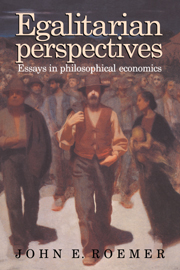Book contents
- Frontmatter
- Contents
- Acknowledgments
- List of sources
- Introduction
- Part I Exploitation
- Part II Equality of resources
- Part III Bargaining theory and justice
- Introduction to Part III
- 9 The mismarriage of bargaining theory and distributive justice
- 10 A challenge to Neo-Lockeanism
- 11 Informational complexity in axiomatic models: benefits and costs
- 12 Distributing health: the allocation of resources by an international agency
- Part IV Public ownership and socialism
- References
- Index
12 - Distributing health: the allocation of resources by an international agency
Published online by Cambridge University Press: 23 December 2009
- Frontmatter
- Contents
- Acknowledgments
- List of sources
- Introduction
- Part I Exploitation
- Part II Equality of resources
- Part III Bargaining theory and justice
- Introduction to Part III
- 9 The mismarriage of bargaining theory and distributive justice
- 10 A challenge to Neo-Lockeanism
- 11 Informational complexity in axiomatic models: benefits and costs
- 12 Distributing health: the allocation of resources by an international agency
- Part IV Public ownership and socialism
- References
- Index
Summary
The problem
An agency of the United Nations has at its disposal an endowment of resources that it will distribute to various countries, with the aim of lowering their rates of infant mortality. The rate of infant survival, abbreviated RIS (one minus the rate of infant mortality), is taken to be an important indicator of the general level of physical well-being of a population, for a high rate is only achieved by good nutrition for women of child-bearing age, clean water supplies, and programmes providing ante-natal care to women. If infant mortality is low, the factors responsible have an impact upon others (than infants and mothers) in the population generally. The level of a population's physical well-being is, of course, an essential ingredient of its quality of life.
When the UN agency looks at the various countries, the data that are most important to it are the rates of infant survival in each country, and the ‘technology’ that the country will use to convert the resources it is granted into a higher RIS. Technology must be broadly interpreted. One country may be particularly efficient at using such resources because it already has a well-organized network of rural clinics in place.
- Type
- Chapter
- Information
- Egalitarian PerspectivesEssays in Philosophical Economics, pp. 243 - 262Publisher: Cambridge University PressPrint publication year: 1994



